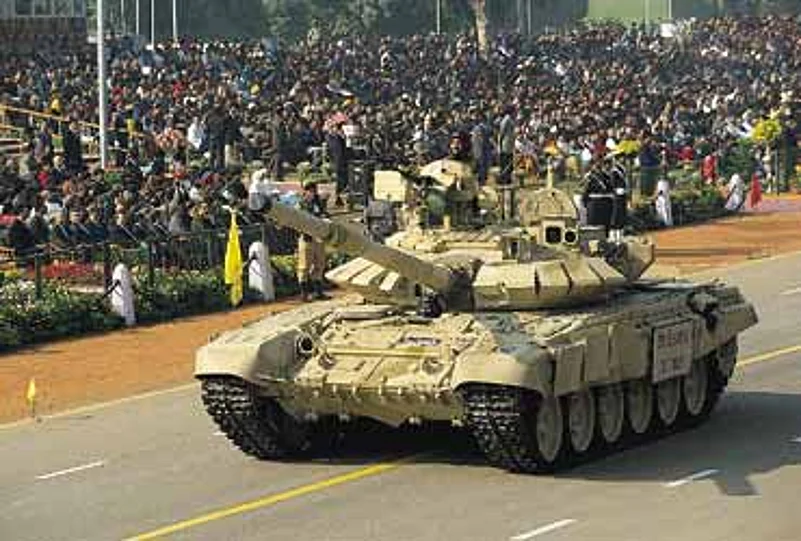
DEADLY DEALS: Technical issues were ignored in the case of T-90 tanks to serve 'vested interests'.
The other deal relates to 26,000 rounds of ammunition for T-72 tanks worth Rs 116.83 crore. This was approved by defence minister George Fernandes in June '99. The supplier was Israeli Military Industries. The spares, costing crores of rupees, have been either unsuitable or "spurious" and were procured at an inflated price, Vittal is reported to have observed.
Outlook has also learnt that Vittal picked holes in the procurement of the Krasnapol (laser-guided artillery) shells from kbp, a firm based in Tula, Russia. This purchase is exhaustively dealt with by the Comptroller and Auditor General's (CAG) audit report which slams the ministry on this emergency procurement during Operation Vijay. A conditional contract was signed in August '99 for the supply of 1,000 terminally guided munitions and 10 laser designators at approximately Rs 150 crore. "For some inexplicable reason, the price negotiation committee upped the price for the shells and designators from Rs 140 crore to Rs 149 crore," said an official in South Block. Coincidentally, Lt Gen Shamsher Mehta played a role in this purchase too, insisting on a 20 per cent advance to the Russian firm.
Despite the failure of the shells to meet the General Staff Qualitative Requirements during the tests and evaluation, the contract was cleared on grounds of operational urgency. In all, six trials were ordered to ensure its acceptance. No vendor has been ever given this concession. In other words, this was a case of pushing for a procurement which would not have otherwise passed the standard procedures.
The other purchases which come under scrutiny are two contracts signed with the same Russian firm, RVZ. The deal was worth Rs 402.76 crore. The guidelines prescribed by the Directorate General of Quality Assurance were overlooked and the shelf-life of four types of ammunition included in the contract had already expired at the time of finalising the contract.
The ammunition inventory consisted of 13.30 lakh rounds of 12.7 mm cartridges, 5,000 125 mm rounds, 36,000 B-429 fuses and 30,000 130 mm cartridges. On all these, the seller was to guarantee the quality and proper functioning of the ammunition for a period of 12 months from the date of arrival. Around this time, the government also concluded a contract with Denel Pty, a South African firm, for 7,300 rounds of illuminating ammunition for 155 mm guns. This contract was for Rs 52.47 crore.
One person privy to the CVC report was Justice K. Venkataswami, who headed the Tehelka probe. But the Opposition saw him as going soft and he put in his papers last year following an uproar in Parliament over his accepting another assignment from the NDA government. Venkataswami too had arrived at his conclusions about the findings on the deals. He told Outlook from Chennai: "I don't want to enter into another controversy over the CVC report." Venkataswami had completed his inquiry into 15 defence transactions at the time of his resignation, including the SU-30 aircraft, T-90 tanks and Krasnapol shells. The Opposition, predictably, is pointing an accusing finger at the government. Says Congress chief whip, Priyaranjan Das Munshi: "The government is reluctant to make public the report as its role and the involvement of kickbacks in the T-90, T-72 tank deals and the second part of the SU-30 fighter bomber aircraft will be exposed."
Ironically, the CVC report was the culmination of the investigation ordered by George Fernandes himself. And the defence minister may not have heard the last on the probe. The Opposition says it is determined to make defence deals an issue in the general elections next year.






















